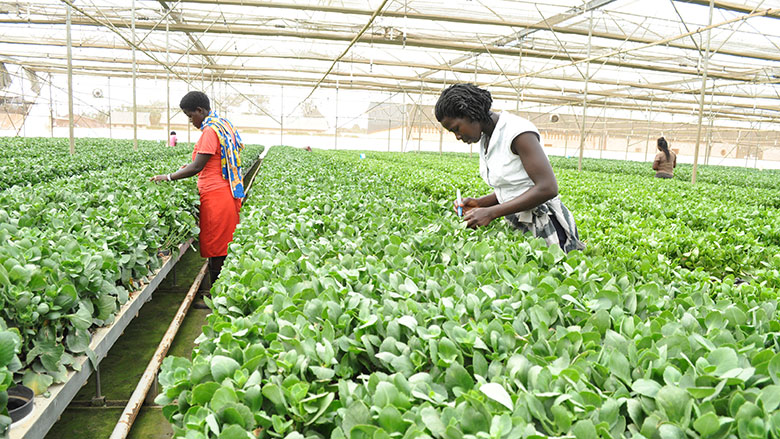KAMPALA, June 8, 2021—In Central Uganda, school children in Kisubi are learning about fish farming and integrated aquaculture, which help to reduce pressure on dwindling water resources and fisheries while increasing fish output and exports. Water from the fishponds is used to irrigate fruits and vegetables, an innovative and efficient use of resources.
This approach to fish farming is one of the key highlights of the latest World Bank Economic Update for Uganda (UEU), which illustrates how Uganda’s economy and people’s livelihoods are tied to sustainable use of the country’s natural resources.
The 17th edition of the economic update, From Crisis to Green Resilient Growth: Investing in Sustainable Land Management and Climate-Smart Agriculture, focuses on how the country should invest in sustainable land management and climate-smart agriculture to achieve sustainable green growth.
“Ugandans’ response to the impact of the global COVID-19 pandemic is a wakeup call for the country to enhance sustainable use of its natural resource capital,” said Tony Thompson, World Bank Country Manager for Uganda. “Uganda needs to increase productivity and build resilience to enhance livelihoods, the economy and general well-being.”
In addition, the report says that macroeconomic recovery and stimulus packages must be combined with measures to address environmental and structural issues to spur a green, resilient, and inclusive growth. The report showcases individuals and communities who have embraced conservation initiatives, such as tree planting, that have increased their access to tree products for household use and income generation. For example, a women’s group known as Wala is involved in environmental conservation through tree planting, supported with small grants. Wala has improved sawlog production and increased sustainable land utilization and improved incomes for its women members.
As the country recovers from COVID-19-induced economic and social disruption, the challenge is to ensure better use of land, soil, water, and biodiversity resources, while restoring degraded resources and their ecosystem functions. In addition, the report underscores the need for climate-smart agricultural practices that enhance resilience, reduce greenhouse gases emissions, and boost national food security.
Agriculture has become particularly important to the livelihoods of Ugandans, says the UEU, hence the need to enhance its sustainability. When jobs were lost and businesses closed due to the Covid-19 crisis, many people returned to agriculture and other natural resource dependent activities to mitigate and survive the crisis. This increased pressure on natural resources that were already strained by rapid population growth, urbanization, influx of refugees and the government’s industrialization drive.
An estimated 41% of Uganda’s land is degraded, according to the report, contributing to economic vulnerabilities and poverty. The rate of degradation and soil erosion is unsustainable and costs about 17% of the country’s gross domestic product (GDP).
“The agricultural sector loses up to 27% of its GDP due to environmental degradation,” said Pushina Ng’andwe, World Bank Senior Agriculture Economist and co-author of the UEU. “Furthermore, the country’s forest cover declines at 2.6% annually, one of the highest rates of forest loss globally.”

Climate risks, including slow onset change and extreme events, exacerbate this natural capital degradation. The report points out that Uganda is losing opportunities for increasing production, incomes, and ecological benefits because adoption of sustainable land management and climate smart agriculture innovations remains low and highly underfunded/underinvested.
“The government needs to prioritize human capital development, greener investment, and support farmers and producers with incentives to adopt sustainable land management and climate smart agriculture practices,” said Rachel Sebudde, World Bank Senior Economist and lead author of the UEU.
The government has mainstreamed sustainable land management and climate-smart agriculture in its development plans, including the Third National Development Plan 2020/21 to 2024/25, Green Growth Development Strategy, Strategic Investment Framework for Sustainable Land Management, and the Paris Agreement. Moreover, increasing resilience in agriculture and natural resources are key measures in the government’s COVID-19 recovery plan.
The World Bank proposes a menu of strategies that Uganda can adopt to accelerate adoption of innovations for a green transition. These include:
- Breaking barriers to adoption of innovations to improve climate resilience and management of land and natural resources. This will enhance opportunities to sustainably raise agricultural productivity and support effective management and preservation of natural capital.
- Shifting public funding towards programmatic approaches and multi-sector implementation to support sustainable land management and climate smart agriculture.
- Scaling up implementation of payment for ecosystem services mechanisms that have been piloted to provide incentives for addressing loss of ecosystem services.
- Supporting rapid transition towards higher productivity, climate resilience and environmental sustainability through coherent and cross-sector natural resource governance policies.
- Prioritizing investments in research and development, extension, and climate services to optimize access to knowledge value chains by farmers and non-state actors.
- Strengthening the link between the national, local, and community-based organizations to close the gap between policy and implementation.
- Promoting market access for diverse agriculture and natural resource-based commodities that provide opportunities for inclusion and value addition without exerting pressure on natural resources.
The report says these measures will enhance Uganda’s commitment to greener, inclusive growth, as well as deepening knowledge sharing and adaptation of good sustainable land management and climate-smart agriculture practices through learning alliances across the country to help scale up and accelerate this process.
